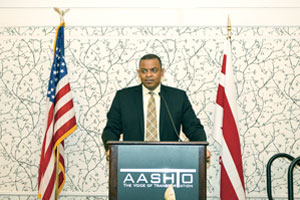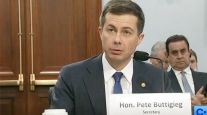Republicans, Foxx Clash on Transportation Budget

This story appears in the March 2 print edition of Transport Topics.
WASHINGTON — U.S. Secretary of Transportation Anthony Foxx’s fiscal 2016 budget pitch to House Republican funding leaders fell flat after several key lawmakers said they would not support the proposal.
The $94.7 billion request for the next fiscal year, up from $72.6 billion this year, was called “fantasy” by Rep. Mario Diaz-Balart (R-Fla.), top transportation appropriator in the House of Representatives.
“I am amazed at the amount of work your staff has put into crafting these justifications for a budget that this Congress can in no way fulfill,” he told the secretary at a Feb. 26 hearing of the Transportation, Housing and Urban Development, and Related Agencies Appropriations Subcommittee.
Diaz-Balart also was quick to dismiss the Obama administration’s six-year, $478 billion Grow America transportation funding plan, calling it a “patch.”
Foxx returned the volley, telling the chairman that the White House’s transportation proposal was hardly a short-term patch. Rather, the plan, which relies on certain corporate tax reforms to fund highway programs, is meant to address years of underinvestment in the country’s transportation system, he said.
The Grow America Act averages $79.71 billion a year.
“The transportation enterprise, and the millions of jobs that come with it, has been thrown into a continuing period of uncertainty due to the numerous short-term spending ‘patches’ that we use to fund” highway programs, Foxx said.
He testified before the committee a day after he addressed the American Association of State Highway and Transportation Officials’ annual meeting here and urged the officials to lobby their members of Congress on the necessity of passing a long-term surface transportation program that will facilitate expansion of the nation’s economy.
Foxx said the lawmakers need to hear “the unadulterated, unvarnished truth” that not only is the current transportation network “inadequate” for 2015, but even more so for 2045. He referred to his department’s report from February, which makes 30-year growth predictions affecting transportation.
The state officials and Foxx agreed on the desirability of a spending program for transportation.
The congestion-plagued transportation network is at a point where “we are trapped by the very thing that is supposed to open opportunity for us,” he said.
The members in the AASHTO audience deal daily with the federal Highway Trust Fund. Scott Bennett, director of the Arkansas Highway and Transportation Department, said much of his state’s spending gets reimbursed at a rate of 70%.
The current legislative extension for the Highway Trust Fund expires May 31, with no replacement in place. Therefore, Bennett said, Arkansas already has pushed back $60 million worth of projects.
“This is a very important issue for all of us,” Bennett said of the 50 state transportation departments.
When he introduced Foxx, AASHTO President John Cox of the Wyoming DOT said that his group’s members would “appreciate a temporary extension” compared with the trust fund’s collapse, but the nation “really needs a long-term bill with sustainable funding.”
At the congressional hearing, the transportation appropriators also agreed a spending program is vital.
“I believe everyone on this subcommittee, and I’d venture most in Congress, believe our country needs a robust, viable and stable transportation infrastructure funding method,” Diaz-Balart said during the hearing.
He added that he expects his subpanel to take up a transportation funding bill that matches with the automatic spending levels in Congress known as budget sequestration.
Foxx is “blowing through the sequester limits, which is a law,” Diaz-Balart told Transport Topics.
The sequester levels are generally supported by Republican leaders but opposed by most Democrats and the Obama administration.
A 2011 debt-limit law set sequestration, imposing discretionary spending caps. According to the Congressional Budget Office, the discretionary cap for fiscal 2016 will be $1.015 trillion. For fiscal 2016, the White House proposes to raise defense and nondefense budget caps by a combined $75 billion.
At the hearing, there was little mention of truck safety rules. Last year, Congress approved the suspension of a key part of the Federal Motor Carrier Safety Administration’s new hours-of-service rule through a funding bill signed into law in December. That law expires Sept. 30.
Asked whether appropriators would again support the suspension of a key HOS rule for truckers, Diaz-Balart said his office was still gathering information about the issue.
“Those issues are issues, obviously, that the committee will look at, and we will have to deal with them, sure,” he said.




